Legal Issues in Business Organizations: Company, Employment, Contract
VerifiedAdded on 2022/11/29
|8
|2715
|428
Essay
AI Summary
This essay analyzes the impact of company law, employment law, and contract law on business organizations, primarily within the UK legal framework. It begins by introducing the Companies Act 2006, highlighting its role in regulating businesses and the importance of employment legislation in maintaining employer-employee relations. The main body delves into the specifics of company law, detailing the duties of directors, the concept of a 'separate legal entity,' and the protection offered by the 'veil of incorporation.' It then explores employment law, outlining key legislation such as the Employment Rights Act 1996, the Equality Act 2010, the Health and Safety at Work Act 1974, and the Data Protection Act 2018, emphasizing their roles in protecting employee rights and fostering healthy work environments. Finally, the essay examines contract law, discussing its significance in business transactions, the essential elements of a valid contract, and its impact on building healthy relationships and preventing disputes. The essay utilizes case law, such as Salomon v Salomon & Co Ltd and Carlill v Carbolic Smoke Ball Co, to illustrate key legal principles and their practical application in business contexts.
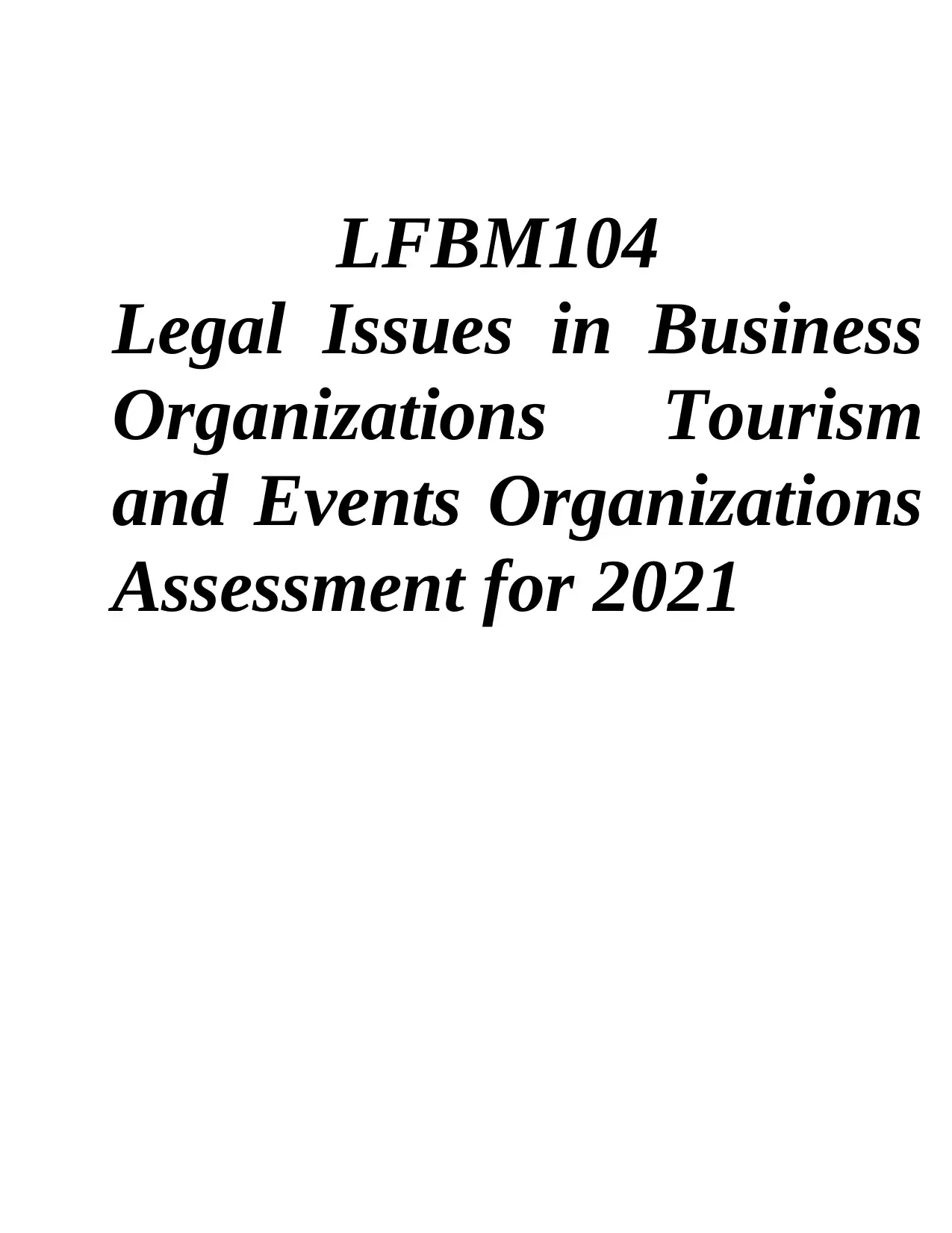
LFBM104
Legal Issues in Business
Organizations Tourism
and Events Organizations
Assessment for 2021
Legal Issues in Business
Organizations Tourism
and Events Organizations
Assessment for 2021
Paraphrase This Document
Need a fresh take? Get an instant paraphrase of this document with our AI Paraphraser
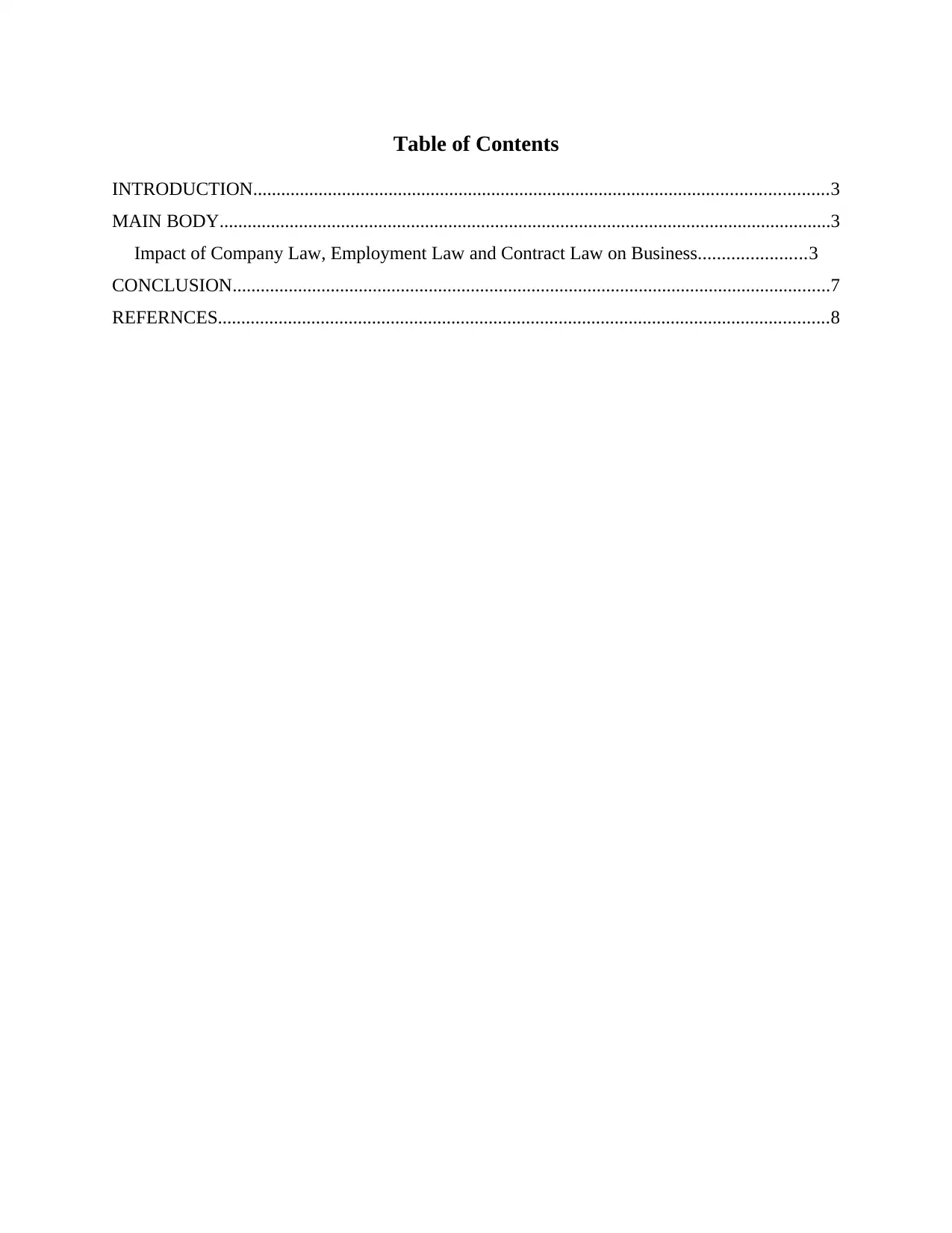
Table of Contents
INTRODUCTION...........................................................................................................................3
MAIN BODY...................................................................................................................................3
Impact of Company Law, Employment Law and Contract Law on Business.......................3
CONCLUSION................................................................................................................................7
REFERNCES...................................................................................................................................8
INTRODUCTION...........................................................................................................................3
MAIN BODY...................................................................................................................................3
Impact of Company Law, Employment Law and Contract Law on Business.......................3
CONCLUSION................................................................................................................................7
REFERNCES...................................................................................................................................8
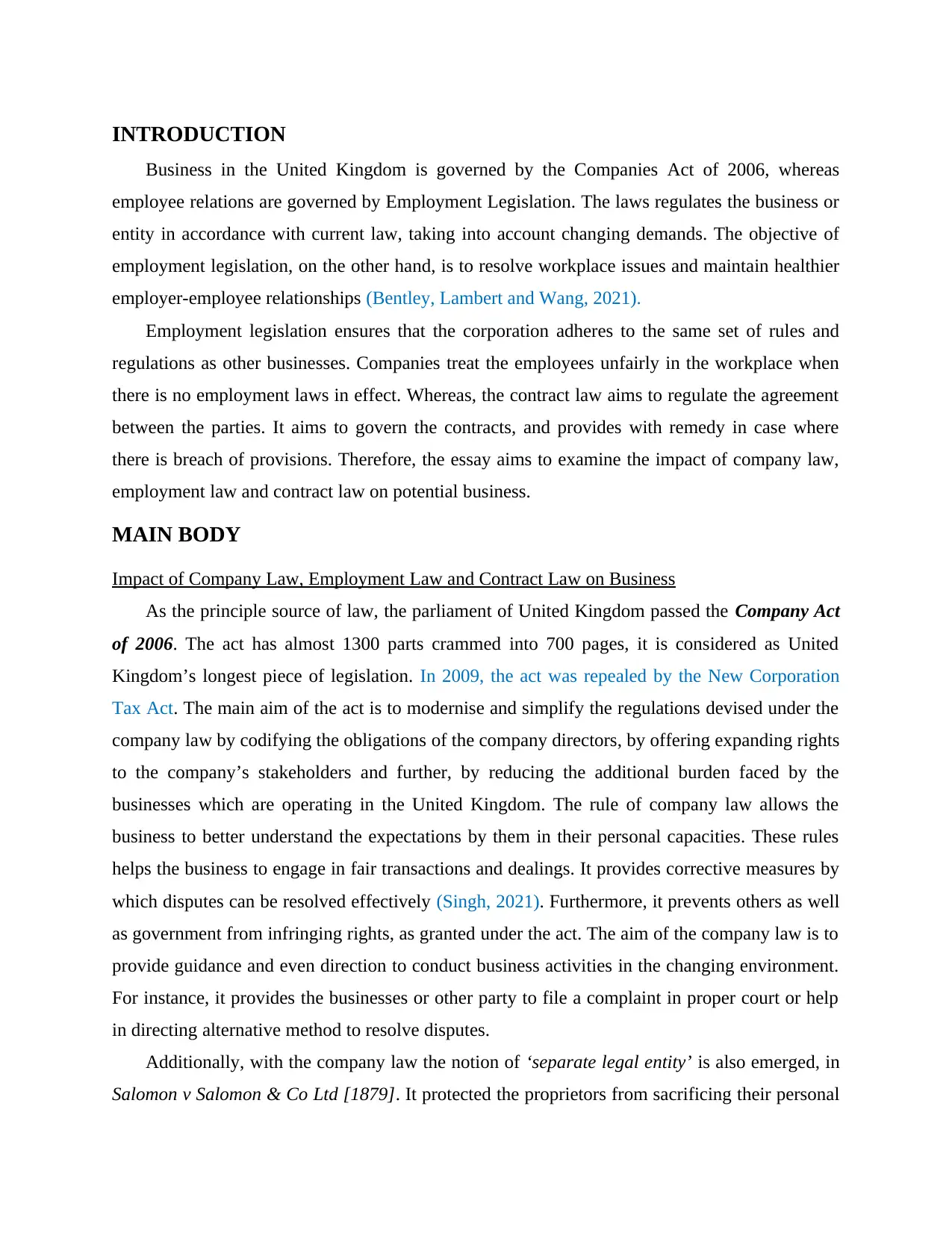
INTRODUCTION
Business in the United Kingdom is governed by the Companies Act of 2006, whereas
employee relations are governed by Employment Legislation. The laws regulates the business or
entity in accordance with current law, taking into account changing demands. The objective of
employment legislation, on the other hand, is to resolve workplace issues and maintain healthier
employer-employee relationships (Bentley, Lambert and Wang, 2021).
Employment legislation ensures that the corporation adheres to the same set of rules and
regulations as other businesses. Companies treat the employees unfairly in the workplace when
there is no employment laws in effect. Whereas, the contract law aims to regulate the agreement
between the parties. It aims to govern the contracts, and provides with remedy in case where
there is breach of provisions. Therefore, the essay aims to examine the impact of company law,
employment law and contract law on potential business.
MAIN BODY
Impact of Company Law, Employment Law and Contract Law on Business
As the principle source of law, the parliament of United Kingdom passed the Company Act
of 2006. The act has almost 1300 parts crammed into 700 pages, it is considered as United
Kingdom’s longest piece of legislation. In 2009, the act was repealed by the New Corporation
Tax Act. The main aim of the act is to modernise and simplify the regulations devised under the
company law by codifying the obligations of the company directors, by offering expanding rights
to the company’s stakeholders and further, by reducing the additional burden faced by the
businesses which are operating in the United Kingdom. The rule of company law allows the
business to better understand the expectations by them in their personal capacities. These rules
helps the business to engage in fair transactions and dealings. It provides corrective measures by
which disputes can be resolved effectively (Singh, 2021). Furthermore, it prevents others as well
as government from infringing rights, as granted under the act. The aim of the company law is to
provide guidance and even direction to conduct business activities in the changing environment.
For instance, it provides the businesses or other party to file a complaint in proper court or help
in directing alternative method to resolve disputes.
Additionally, with the company law the notion of ‘separate legal entity’ is also emerged, in
Salomon v Salomon & Co Ltd [1879]. It protected the proprietors from sacrificing their personal
Business in the United Kingdom is governed by the Companies Act of 2006, whereas
employee relations are governed by Employment Legislation. The laws regulates the business or
entity in accordance with current law, taking into account changing demands. The objective of
employment legislation, on the other hand, is to resolve workplace issues and maintain healthier
employer-employee relationships (Bentley, Lambert and Wang, 2021).
Employment legislation ensures that the corporation adheres to the same set of rules and
regulations as other businesses. Companies treat the employees unfairly in the workplace when
there is no employment laws in effect. Whereas, the contract law aims to regulate the agreement
between the parties. It aims to govern the contracts, and provides with remedy in case where
there is breach of provisions. Therefore, the essay aims to examine the impact of company law,
employment law and contract law on potential business.
MAIN BODY
Impact of Company Law, Employment Law and Contract Law on Business
As the principle source of law, the parliament of United Kingdom passed the Company Act
of 2006. The act has almost 1300 parts crammed into 700 pages, it is considered as United
Kingdom’s longest piece of legislation. In 2009, the act was repealed by the New Corporation
Tax Act. The main aim of the act is to modernise and simplify the regulations devised under the
company law by codifying the obligations of the company directors, by offering expanding rights
to the company’s stakeholders and further, by reducing the additional burden faced by the
businesses which are operating in the United Kingdom. The rule of company law allows the
business to better understand the expectations by them in their personal capacities. These rules
helps the business to engage in fair transactions and dealings. It provides corrective measures by
which disputes can be resolved effectively (Singh, 2021). Furthermore, it prevents others as well
as government from infringing rights, as granted under the act. The aim of the company law is to
provide guidance and even direction to conduct business activities in the changing environment.
For instance, it provides the businesses or other party to file a complaint in proper court or help
in directing alternative method to resolve disputes.
Additionally, with the company law the notion of ‘separate legal entity’ is also emerged, in
Salomon v Salomon & Co Ltd [1879]. It protected the proprietors from sacrificing their personal
⊘ This is a preview!⊘
Do you want full access?
Subscribe today to unlock all pages.

Trusted by 1+ million students worldwide
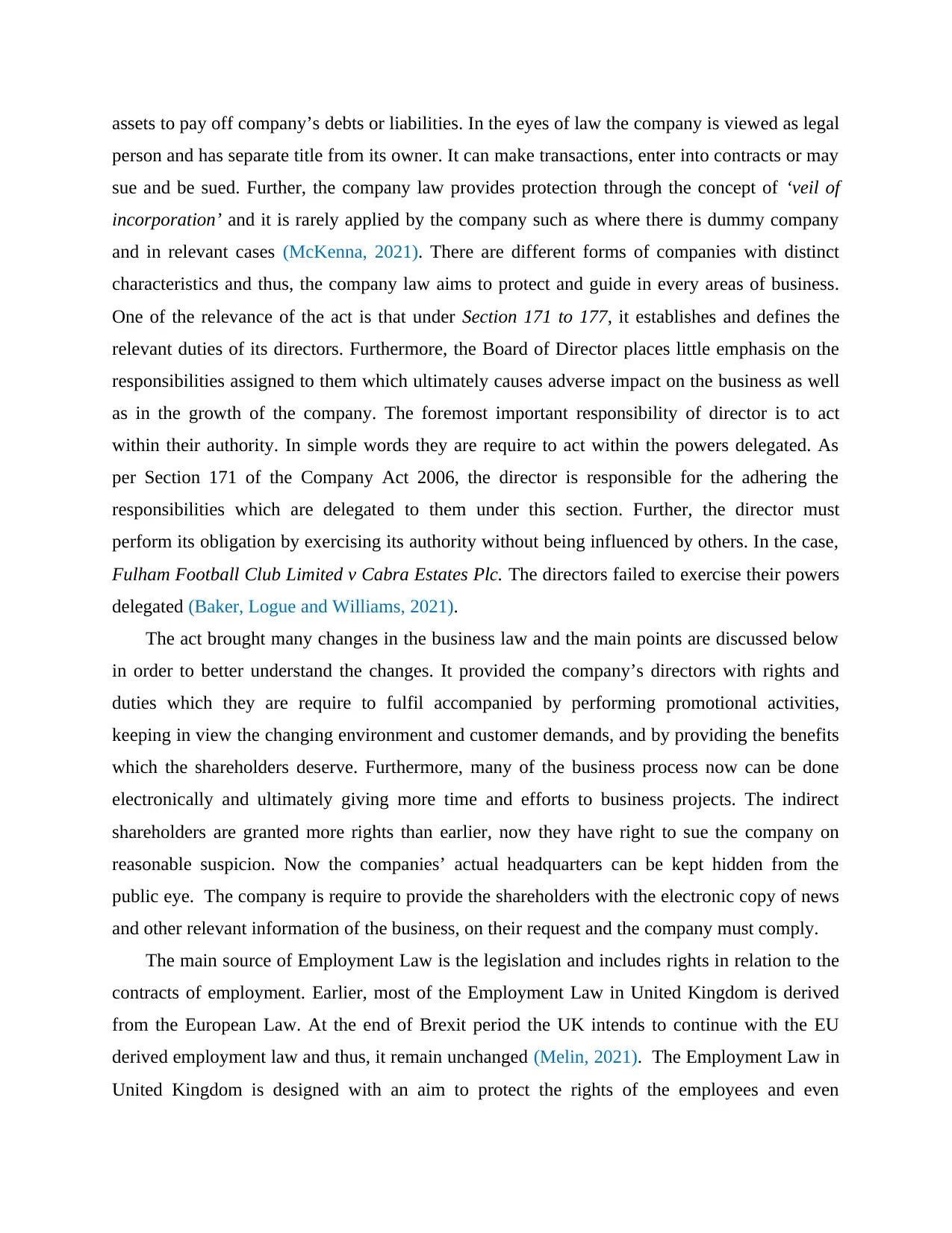
assets to pay off company’s debts or liabilities. In the eyes of law the company is viewed as legal
person and has separate title from its owner. It can make transactions, enter into contracts or may
sue and be sued. Further, the company law provides protection through the concept of ‘veil of
incorporation’ and it is rarely applied by the company such as where there is dummy company
and in relevant cases (McKenna, 2021). There are different forms of companies with distinct
characteristics and thus, the company law aims to protect and guide in every areas of business.
One of the relevance of the act is that under Section 171 to 177, it establishes and defines the
relevant duties of its directors. Furthermore, the Board of Director places little emphasis on the
responsibilities assigned to them which ultimately causes adverse impact on the business as well
as in the growth of the company. The foremost important responsibility of director is to act
within their authority. In simple words they are require to act within the powers delegated. As
per Section 171 of the Company Act 2006, the director is responsible for the adhering the
responsibilities which are delegated to them under this section. Further, the director must
perform its obligation by exercising its authority without being influenced by others. In the case,
Fulham Football Club Limited v Cabra Estates Plc. The directors failed to exercise their powers
delegated (Baker, Logue and Williams, 2021).
The act brought many changes in the business law and the main points are discussed below
in order to better understand the changes. It provided the company’s directors with rights and
duties which they are require to fulfil accompanied by performing promotional activities,
keeping in view the changing environment and customer demands, and by providing the benefits
which the shareholders deserve. Furthermore, many of the business process now can be done
electronically and ultimately giving more time and efforts to business projects. The indirect
shareholders are granted more rights than earlier, now they have right to sue the company on
reasonable suspicion. Now the companies’ actual headquarters can be kept hidden from the
public eye. The company is require to provide the shareholders with the electronic copy of news
and other relevant information of the business, on their request and the company must comply.
The main source of Employment Law is the legislation and includes rights in relation to the
contracts of employment. Earlier, most of the Employment Law in United Kingdom is derived
from the European Law. At the end of Brexit period the UK intends to continue with the EU
derived employment law and thus, it remain unchanged (Melin, 2021). The Employment Law in
United Kingdom is designed with an aim to protect the rights of the employees and even
person and has separate title from its owner. It can make transactions, enter into contracts or may
sue and be sued. Further, the company law provides protection through the concept of ‘veil of
incorporation’ and it is rarely applied by the company such as where there is dummy company
and in relevant cases (McKenna, 2021). There are different forms of companies with distinct
characteristics and thus, the company law aims to protect and guide in every areas of business.
One of the relevance of the act is that under Section 171 to 177, it establishes and defines the
relevant duties of its directors. Furthermore, the Board of Director places little emphasis on the
responsibilities assigned to them which ultimately causes adverse impact on the business as well
as in the growth of the company. The foremost important responsibility of director is to act
within their authority. In simple words they are require to act within the powers delegated. As
per Section 171 of the Company Act 2006, the director is responsible for the adhering the
responsibilities which are delegated to them under this section. Further, the director must
perform its obligation by exercising its authority without being influenced by others. In the case,
Fulham Football Club Limited v Cabra Estates Plc. The directors failed to exercise their powers
delegated (Baker, Logue and Williams, 2021).
The act brought many changes in the business law and the main points are discussed below
in order to better understand the changes. It provided the company’s directors with rights and
duties which they are require to fulfil accompanied by performing promotional activities,
keeping in view the changing environment and customer demands, and by providing the benefits
which the shareholders deserve. Furthermore, many of the business process now can be done
electronically and ultimately giving more time and efforts to business projects. The indirect
shareholders are granted more rights than earlier, now they have right to sue the company on
reasonable suspicion. Now the companies’ actual headquarters can be kept hidden from the
public eye. The company is require to provide the shareholders with the electronic copy of news
and other relevant information of the business, on their request and the company must comply.
The main source of Employment Law is the legislation and includes rights in relation to the
contracts of employment. Earlier, most of the Employment Law in United Kingdom is derived
from the European Law. At the end of Brexit period the UK intends to continue with the EU
derived employment law and thus, it remain unchanged (Melin, 2021). The Employment Law in
United Kingdom is designed with an aim to protect the rights of the employees and even
Paraphrase This Document
Need a fresh take? Get an instant paraphrase of this document with our AI Paraphraser
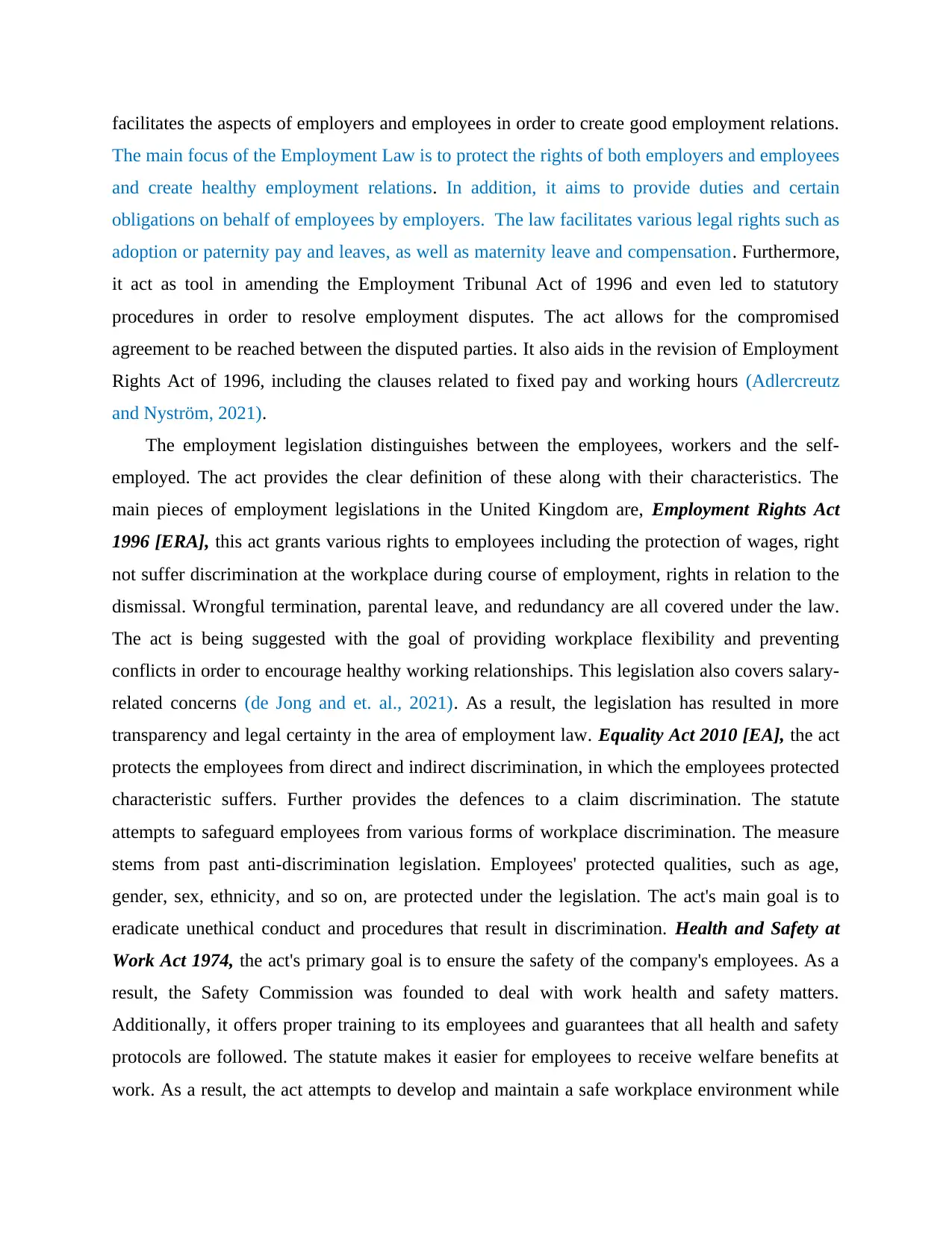
facilitates the aspects of employers and employees in order to create good employment relations.
The main focus of the Employment Law is to protect the rights of both employers and employees
and create healthy employment relations. In addition, it aims to provide duties and certain
obligations on behalf of employees by employers. The law facilitates various legal rights such as
adoption or paternity pay and leaves, as well as maternity leave and compensation. Furthermore,
it act as tool in amending the Employment Tribunal Act of 1996 and even led to statutory
procedures in order to resolve employment disputes. The act allows for the compromised
agreement to be reached between the disputed parties. It also aids in the revision of Employment
Rights Act of 1996, including the clauses related to fixed pay and working hours (Adlercreutz
and Nyström, 2021).
The employment legislation distinguishes between the employees, workers and the self-
employed. The act provides the clear definition of these along with their characteristics. The
main pieces of employment legislations in the United Kingdom are, Employment Rights Act
1996 [ERA], this act grants various rights to employees including the protection of wages, right
not suffer discrimination at the workplace during course of employment, rights in relation to the
dismissal. Wrongful termination, parental leave, and redundancy are all covered under the law.
The act is being suggested with the goal of providing workplace flexibility and preventing
conflicts in order to encourage healthy working relationships. This legislation also covers salary-
related concerns (de Jong and et. al., 2021). As a result, the legislation has resulted in more
transparency and legal certainty in the area of employment law. Equality Act 2010 [EA], the act
protects the employees from direct and indirect discrimination, in which the employees protected
characteristic suffers. Further provides the defences to a claim discrimination. The statute
attempts to safeguard employees from various forms of workplace discrimination. The measure
stems from past anti-discrimination legislation. Employees' protected qualities, such as age,
gender, sex, ethnicity, and so on, are protected under the legislation. The act's main goal is to
eradicate unethical conduct and procedures that result in discrimination. Health and Safety at
Work Act 1974, the act's primary goal is to ensure the safety of the company's employees. As a
result, the Safety Commission was founded to deal with work health and safety matters.
Additionally, it offers proper training to its employees and guarantees that all health and safety
protocols are followed. The statute makes it easier for employees to receive welfare benefits at
work. As a result, the act attempts to develop and maintain a safe workplace environment while
The main focus of the Employment Law is to protect the rights of both employers and employees
and create healthy employment relations. In addition, it aims to provide duties and certain
obligations on behalf of employees by employers. The law facilitates various legal rights such as
adoption or paternity pay and leaves, as well as maternity leave and compensation. Furthermore,
it act as tool in amending the Employment Tribunal Act of 1996 and even led to statutory
procedures in order to resolve employment disputes. The act allows for the compromised
agreement to be reached between the disputed parties. It also aids in the revision of Employment
Rights Act of 1996, including the clauses related to fixed pay and working hours (Adlercreutz
and Nyström, 2021).
The employment legislation distinguishes between the employees, workers and the self-
employed. The act provides the clear definition of these along with their characteristics. The
main pieces of employment legislations in the United Kingdom are, Employment Rights Act
1996 [ERA], this act grants various rights to employees including the protection of wages, right
not suffer discrimination at the workplace during course of employment, rights in relation to the
dismissal. Wrongful termination, parental leave, and redundancy are all covered under the law.
The act is being suggested with the goal of providing workplace flexibility and preventing
conflicts in order to encourage healthy working relationships. This legislation also covers salary-
related concerns (de Jong and et. al., 2021). As a result, the legislation has resulted in more
transparency and legal certainty in the area of employment law. Equality Act 2010 [EA], the act
protects the employees from direct and indirect discrimination, in which the employees protected
characteristic suffers. Further provides the defences to a claim discrimination. The statute
attempts to safeguard employees from various forms of workplace discrimination. The measure
stems from past anti-discrimination legislation. Employees' protected qualities, such as age,
gender, sex, ethnicity, and so on, are protected under the legislation. The act's main goal is to
eradicate unethical conduct and procedures that result in discrimination. Health and Safety at
Work Act 1974, the act's primary goal is to ensure the safety of the company's employees. As a
result, the Safety Commission was founded to deal with work health and safety matters.
Additionally, it offers proper training to its employees and guarantees that all health and safety
protocols are followed. The statute makes it easier for employees to receive welfare benefits at
work. As a result, the act attempts to develop and maintain a safe workplace environment while
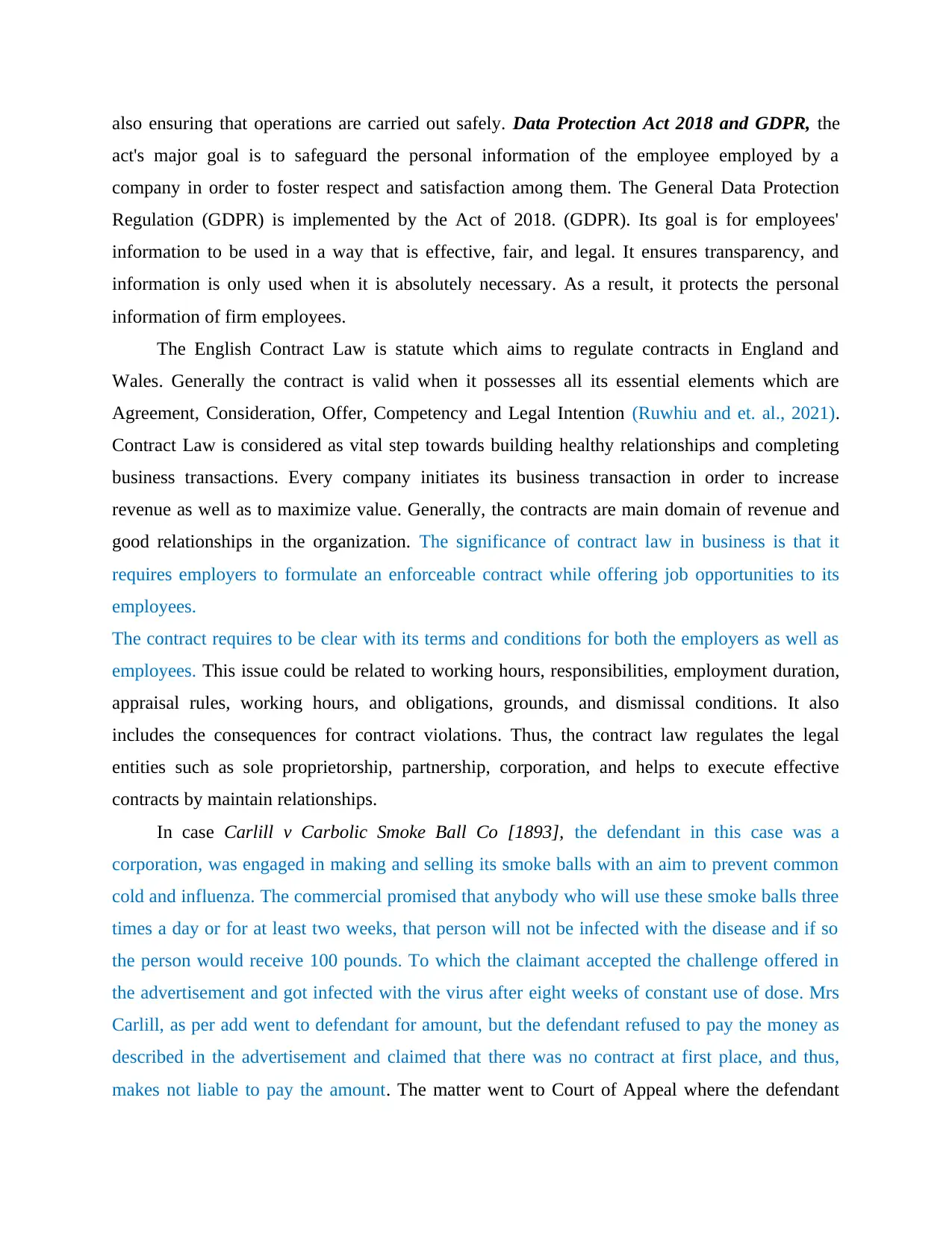
also ensuring that operations are carried out safely. Data Protection Act 2018 and GDPR, the
act's major goal is to safeguard the personal information of the employee employed by a
company in order to foster respect and satisfaction among them. The General Data Protection
Regulation (GDPR) is implemented by the Act of 2018. (GDPR). Its goal is for employees'
information to be used in a way that is effective, fair, and legal. It ensures transparency, and
information is only used when it is absolutely necessary. As a result, it protects the personal
information of firm employees.
The English Contract Law is statute which aims to regulate contracts in England and
Wales. Generally the contract is valid when it possesses all its essential elements which are
Agreement, Consideration, Offer, Competency and Legal Intention (Ruwhiu and et. al., 2021).
Contract Law is considered as vital step towards building healthy relationships and completing
business transactions. Every company initiates its business transaction in order to increase
revenue as well as to maximize value. Generally, the contracts are main domain of revenue and
good relationships in the organization. The significance of contract law in business is that it
requires employers to formulate an enforceable contract while offering job opportunities to its
employees.
The contract requires to be clear with its terms and conditions for both the employers as well as
employees. This issue could be related to working hours, responsibilities, employment duration,
appraisal rules, working hours, and obligations, grounds, and dismissal conditions. It also
includes the consequences for contract violations. Thus, the contract law regulates the legal
entities such as sole proprietorship, partnership, corporation, and helps to execute effective
contracts by maintain relationships.
In case Carlill v Carbolic Smoke Ball Co [1893], the defendant in this case was a
corporation, was engaged in making and selling its smoke balls with an aim to prevent common
cold and influenza. The commercial promised that anybody who will use these smoke balls three
times a day or for at least two weeks, that person will not be infected with the disease and if so
the person would receive 100 pounds. To which the claimant accepted the challenge offered in
the advertisement and got infected with the virus after eight weeks of constant use of dose. Mrs
Carlill, as per add went to defendant for amount, but the defendant refused to pay the money as
described in the advertisement and claimed that there was no contract at first place, and thus,
makes not liable to pay the amount. The matter went to Court of Appeal where the defendant
act's major goal is to safeguard the personal information of the employee employed by a
company in order to foster respect and satisfaction among them. The General Data Protection
Regulation (GDPR) is implemented by the Act of 2018. (GDPR). Its goal is for employees'
information to be used in a way that is effective, fair, and legal. It ensures transparency, and
information is only used when it is absolutely necessary. As a result, it protects the personal
information of firm employees.
The English Contract Law is statute which aims to regulate contracts in England and
Wales. Generally the contract is valid when it possesses all its essential elements which are
Agreement, Consideration, Offer, Competency and Legal Intention (Ruwhiu and et. al., 2021).
Contract Law is considered as vital step towards building healthy relationships and completing
business transactions. Every company initiates its business transaction in order to increase
revenue as well as to maximize value. Generally, the contracts are main domain of revenue and
good relationships in the organization. The significance of contract law in business is that it
requires employers to formulate an enforceable contract while offering job opportunities to its
employees.
The contract requires to be clear with its terms and conditions for both the employers as well as
employees. This issue could be related to working hours, responsibilities, employment duration,
appraisal rules, working hours, and obligations, grounds, and dismissal conditions. It also
includes the consequences for contract violations. Thus, the contract law regulates the legal
entities such as sole proprietorship, partnership, corporation, and helps to execute effective
contracts by maintain relationships.
In case Carlill v Carbolic Smoke Ball Co [1893], the defendant in this case was a
corporation, was engaged in making and selling its smoke balls with an aim to prevent common
cold and influenza. The commercial promised that anybody who will use these smoke balls three
times a day or for at least two weeks, that person will not be infected with the disease and if so
the person would receive 100 pounds. To which the claimant accepted the challenge offered in
the advertisement and got infected with the virus after eight weeks of constant use of dose. Mrs
Carlill, as per add went to defendant for amount, but the defendant refused to pay the money as
described in the advertisement and claimed that there was no contract at first place, and thus,
makes not liable to pay the amount. The matter went to Court of Appeal where the defendant
⊘ This is a preview!⊘
Do you want full access?
Subscribe today to unlock all pages.

Trusted by 1+ million students worldwide
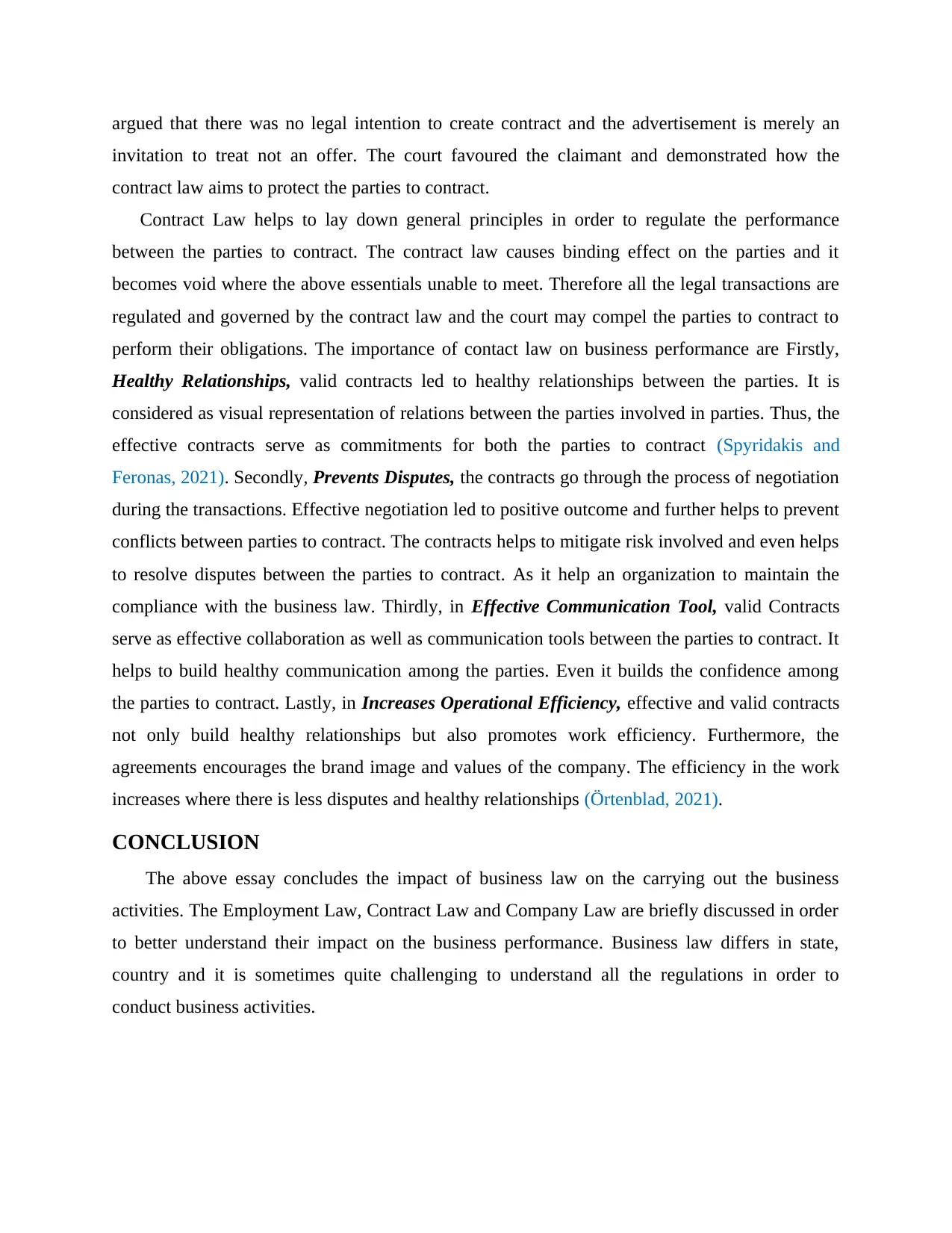
argued that there was no legal intention to create contract and the advertisement is merely an
invitation to treat not an offer. The court favoured the claimant and demonstrated how the
contract law aims to protect the parties to contract.
Contract Law helps to lay down general principles in order to regulate the performance
between the parties to contract. The contract law causes binding effect on the parties and it
becomes void where the above essentials unable to meet. Therefore all the legal transactions are
regulated and governed by the contract law and the court may compel the parties to contract to
perform their obligations. The importance of contact law on business performance are Firstly,
Healthy Relationships, valid contracts led to healthy relationships between the parties. It is
considered as visual representation of relations between the parties involved in parties. Thus, the
effective contracts serve as commitments for both the parties to contract (Spyridakis and
Feronas, 2021). Secondly, Prevents Disputes, the contracts go through the process of negotiation
during the transactions. Effective negotiation led to positive outcome and further helps to prevent
conflicts between parties to contract. The contracts helps to mitigate risk involved and even helps
to resolve disputes between the parties to contract. As it help an organization to maintain the
compliance with the business law. Thirdly, in Effective Communication Tool, valid Contracts
serve as effective collaboration as well as communication tools between the parties to contract. It
helps to build healthy communication among the parties. Even it builds the confidence among
the parties to contract. Lastly, in Increases Operational Efficiency, effective and valid contracts
not only build healthy relationships but also promotes work efficiency. Furthermore, the
agreements encourages the brand image and values of the company. The efficiency in the work
increases where there is less disputes and healthy relationships (Örtenblad, 2021).
CONCLUSION
The above essay concludes the impact of business law on the carrying out the business
activities. The Employment Law, Contract Law and Company Law are briefly discussed in order
to better understand their impact on the business performance. Business law differs in state,
country and it is sometimes quite challenging to understand all the regulations in order to
conduct business activities.
invitation to treat not an offer. The court favoured the claimant and demonstrated how the
contract law aims to protect the parties to contract.
Contract Law helps to lay down general principles in order to regulate the performance
between the parties to contract. The contract law causes binding effect on the parties and it
becomes void where the above essentials unable to meet. Therefore all the legal transactions are
regulated and governed by the contract law and the court may compel the parties to contract to
perform their obligations. The importance of contact law on business performance are Firstly,
Healthy Relationships, valid contracts led to healthy relationships between the parties. It is
considered as visual representation of relations between the parties involved in parties. Thus, the
effective contracts serve as commitments for both the parties to contract (Spyridakis and
Feronas, 2021). Secondly, Prevents Disputes, the contracts go through the process of negotiation
during the transactions. Effective negotiation led to positive outcome and further helps to prevent
conflicts between parties to contract. The contracts helps to mitigate risk involved and even helps
to resolve disputes between the parties to contract. As it help an organization to maintain the
compliance with the business law. Thirdly, in Effective Communication Tool, valid Contracts
serve as effective collaboration as well as communication tools between the parties to contract. It
helps to build healthy communication among the parties. Even it builds the confidence among
the parties to contract. Lastly, in Increases Operational Efficiency, effective and valid contracts
not only build healthy relationships but also promotes work efficiency. Furthermore, the
agreements encourages the brand image and values of the company. The efficiency in the work
increases where there is less disputes and healthy relationships (Örtenblad, 2021).
CONCLUSION
The above essay concludes the impact of business law on the carrying out the business
activities. The Employment Law, Contract Law and Company Law are briefly discussed in order
to better understand their impact on the business performance. Business law differs in state,
country and it is sometimes quite challenging to understand all the regulations in order to
conduct business activities.
Paraphrase This Document
Need a fresh take? Get an instant paraphrase of this document with our AI Paraphraser
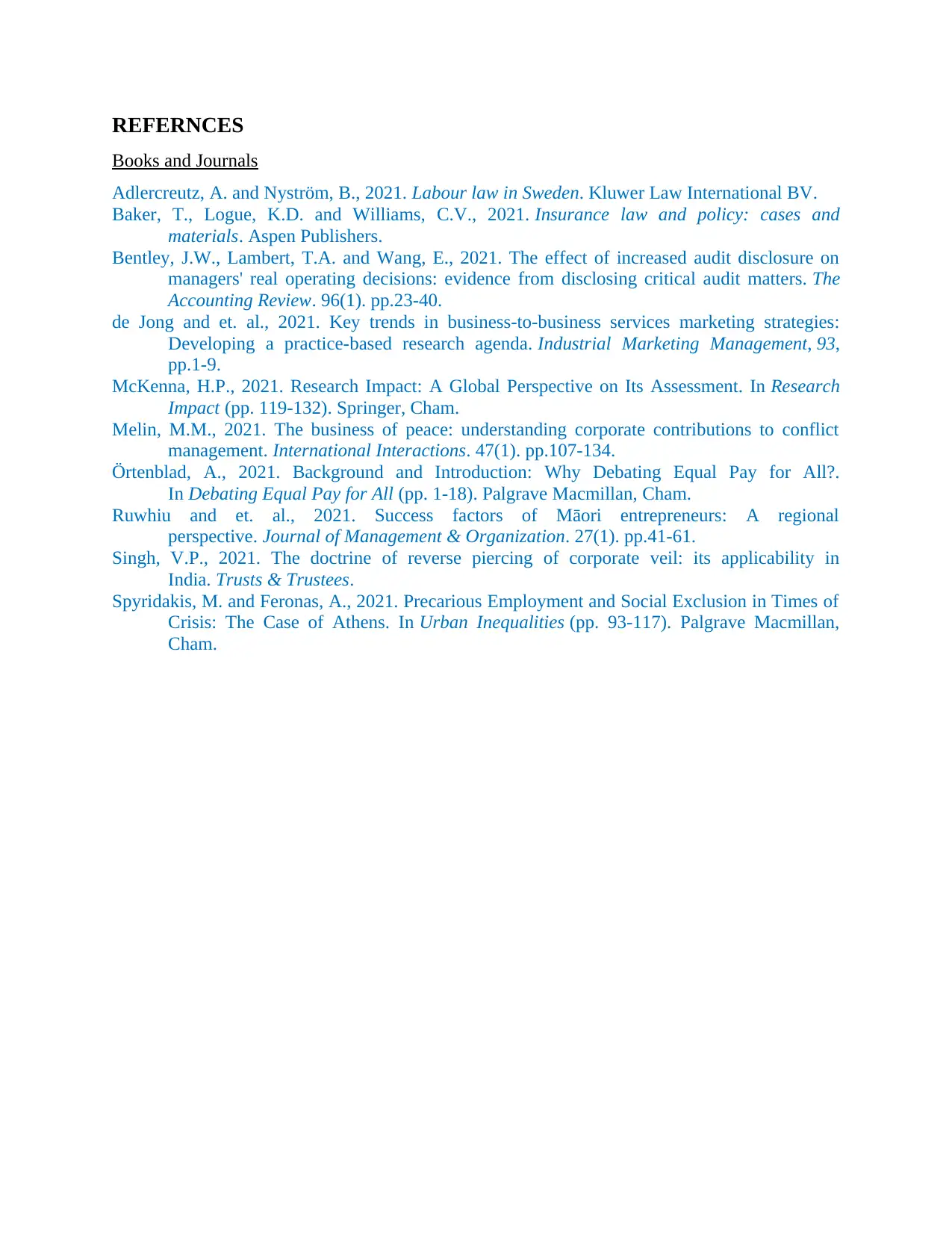
REFERNCES
Books and Journals
Adlercreutz, A. and Nyström, B., 2021. Labour law in Sweden. Kluwer Law International BV.
Baker, T., Logue, K.D. and Williams, C.V., 2021. Insurance law and policy: cases and
materials. Aspen Publishers.
Bentley, J.W., Lambert, T.A. and Wang, E., 2021. The effect of increased audit disclosure on
managers' real operating decisions: evidence from disclosing critical audit matters. The
Accounting Review. 96(1). pp.23-40.
de Jong and et. al., 2021. Key trends in business-to-business services marketing strategies:
Developing a practice-based research agenda. Industrial Marketing Management, 93,
pp.1-9.
McKenna, H.P., 2021. Research Impact: A Global Perspective on Its Assessment. In Research
Impact (pp. 119-132). Springer, Cham.
Melin, M.M., 2021. The business of peace: understanding corporate contributions to conflict
management. International Interactions. 47(1). pp.107-134.
Örtenblad, A., 2021. Background and Introduction: Why Debating Equal Pay for All?.
In Debating Equal Pay for All (pp. 1-18). Palgrave Macmillan, Cham.
Ruwhiu and et. al., 2021. Success factors of Māori entrepreneurs: A regional
perspective. Journal of Management & Organization. 27(1). pp.41-61.
Singh, V.P., 2021. The doctrine of reverse piercing of corporate veil: its applicability in
India. Trusts & Trustees.
Spyridakis, M. and Feronas, A., 2021. Precarious Employment and Social Exclusion in Times of
Crisis: The Case of Athens. In Urban Inequalities (pp. 93-117). Palgrave Macmillan,
Cham.
Books and Journals
Adlercreutz, A. and Nyström, B., 2021. Labour law in Sweden. Kluwer Law International BV.
Baker, T., Logue, K.D. and Williams, C.V., 2021. Insurance law and policy: cases and
materials. Aspen Publishers.
Bentley, J.W., Lambert, T.A. and Wang, E., 2021. The effect of increased audit disclosure on
managers' real operating decisions: evidence from disclosing critical audit matters. The
Accounting Review. 96(1). pp.23-40.
de Jong and et. al., 2021. Key trends in business-to-business services marketing strategies:
Developing a practice-based research agenda. Industrial Marketing Management, 93,
pp.1-9.
McKenna, H.P., 2021. Research Impact: A Global Perspective on Its Assessment. In Research
Impact (pp. 119-132). Springer, Cham.
Melin, M.M., 2021. The business of peace: understanding corporate contributions to conflict
management. International Interactions. 47(1). pp.107-134.
Örtenblad, A., 2021. Background and Introduction: Why Debating Equal Pay for All?.
In Debating Equal Pay for All (pp. 1-18). Palgrave Macmillan, Cham.
Ruwhiu and et. al., 2021. Success factors of Māori entrepreneurs: A regional
perspective. Journal of Management & Organization. 27(1). pp.41-61.
Singh, V.P., 2021. The doctrine of reverse piercing of corporate veil: its applicability in
India. Trusts & Trustees.
Spyridakis, M. and Feronas, A., 2021. Precarious Employment and Social Exclusion in Times of
Crisis: The Case of Athens. In Urban Inequalities (pp. 93-117). Palgrave Macmillan,
Cham.
1 out of 8
Related Documents
Your All-in-One AI-Powered Toolkit for Academic Success.
+13062052269
info@desklib.com
Available 24*7 on WhatsApp / Email
![[object Object]](/_next/static/media/star-bottom.7253800d.svg)
Unlock your academic potential
Copyright © 2020–2026 A2Z Services. All Rights Reserved. Developed and managed by ZUCOL.





